03:52

Canary Wharf became the latest symbol of the global real estate downturn, with credit rating agency Moody's downgrading the rating of the holding company and forecasting a challenging funding environment for at least the next year.
European property markets continue to suffer record low returns in 2023. Among the factors influencing this phenomenon include rising interest rates, banking turmoil and a moderate economic picture.
The lingering impact of the Covid-19 pandemic and its effect on workers' habits cannot be overlooked. A shift to a hybrid working model and a dwindling need for long hours in the office has meant high-rise commercial blocks and office spaces around the globe have emptied out.
In Europe, companies are slowly bringing staffers back, but the commercial real estate market has a new look post-pandemic. Property economists warn that the traditional property sector, as we know it, is under threat and is particularly vulnerable to these rising costs.
READ MORE
Why millions could leave cities due to COVID-19
Paris wins AirBnB court case
How has COVID-19 changed the luxury market?
Industry experts say residential and retail have already shown signs of a bounce back. The struggle has been in the commercial property sector. Investors are largely shying away, resulting in an 11-year low in European commercial real estate investment: Deals in this category are down 62 percent on last year.
Professional service tenants like law practices, consultancy groups and finance firms are having to negotiate fresh rental agreements at a time when desk occupancy is still low. Offices are the largest component of the commercial property market here - and in Europe, lenders have already backed the industry to the tune of $1.6 trillion.
With increased borrowing costs amid an inflation boom, and the Covid crisis aftermath, both landlords and investors are being forced to adapt their strategies if they want to stay in business.

French properties are lying unused (and increasingly flyblown). /CGTN
French properties are lying unused (and increasingly flyblown). /CGTN
On the outskirts of Paris, dozens of dormant business complexes are being rezoned to address the housing crisis. For urban developers at Novaxia, the industry is on the cusp of big changes.
"Before Covid-19, in France we had roughly 2 million square meters empty. Today, we have more than 4.5 million square meters empty," explains Novaxia president and founder Joachim Azan. "In the next three years, the forecast concludes that we will reach close to 10 million square meters empty thanks to the remote office. People prefer to work from home."
Azan predicts that over the next four years, one in five office buildings will be vacant.
Green issues are also playing a part in the narrative. Francois Viruly, Director of Urban Real Estate Research Unit at the University of Cape Town, says that using already-built structures must be the priority to limit the environmental impact.
"The greenest building is the building that already exists – most of the energy of a building is building it," he says. "The biggest thing we can do in a built environment is reuse existing buildings. That's the greenest thing we can do in the real estate sector."
Property economists agree that the age of the business district isn't dead, but Viruly stresses that to accommodate tenants' new work habits and lifestyle needs, and withstand inflationary pressures, the future built environment will have to include a mixed-use offering.
"We used to call these places CBDs, central business districts. I think we're going to change that to 'social districts," he forecasts. "Let's move away from the idea that the place is only for business. In many of these areas we will see a better mix between home, work, play and education than we saw in the past."
Experts also forecast that the locations sought by future remodeled office spaces could also appeal to hotels. This means competition for the next prime real estate could get even tougher.

Subscribe to Storyboard: A weekly newsletter bringing you the best of CGTN every Friday